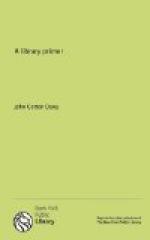There is nothing out of place in the comparing of the library to the school and the college, but its true mission is not to be so limited. To a large extent it is to be compared, as an object of public care and expense, with the park, the modern common, where there are flower-beds, rare plants in conservatories, lakes with boats in summer and skating in winter, and music by excellent bands. Not very strictly useful, these things, but recognized everywhere as ministering to the real culture of the people. Let this library, then, be the place where you will come, not merely to study and store your minds with so-called “useful” knowledge, but also often to have a good time; to refresh your minds and hearts with humor and poetry and fiction. Let the boys find here wholesome books of adventure, and tales such as a boy likes; let the girls find the stories which delight them and give their fancy and imagination exercise; let the tired housewife find the novels which will transport her to an ideal realm of love and happiness; let the hard-worked man, instead of being expected always to read “improving” books of history or politics, choose that which shall give him relaxation of mind and nerve, perhaps the Innocents abroad, or Josh Billings’ “Allminax,” or Samanthy at Saratoga.
CHAPTER XXXIX
Books as useful tools
There is still too much of superstition and reverence mingled with the thought of books and literature, and study and studentship in the popular mind. Books are tools, of which here and there one is useful for a certain purpose to a certain person. The farmer consults his farm paper on the mixing of pig-feed; the cook takes from the latest treatise the rules for a new salad; the chemist finds in his journal the last word on the detection of poisons; the man of affairs turns to the last market reports for guidance in his day’s transactions; and all have used books, have studied literature. The hammer and the poem, the hoe and the dictionary, the engine and the encyclopedia, the trowel and the treatise on philosophy—these are tools. One and all, they are expressions of the life of the race. But they are not, for that reason, to be reverenced. They are proper for man’s service, not man for theirs. Approach books, then, as you would a sewing machine, a school, or a factory.
Literature, after all, is simply all that’s printed. In print are found the sum of the experience and observation of the whole race. Out of this print it is the librarian’s business to help his fellows to draw such facts and suggestions as may aid them in their work.
CHAPTER XL
A village library successfully managed
James R. Garfield, in Public Libraries, October, 1896




